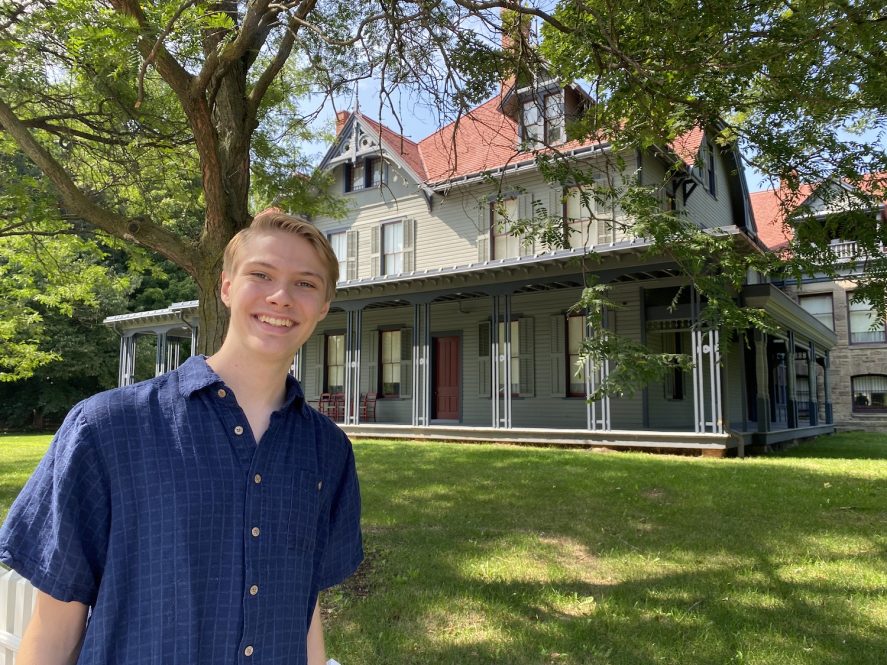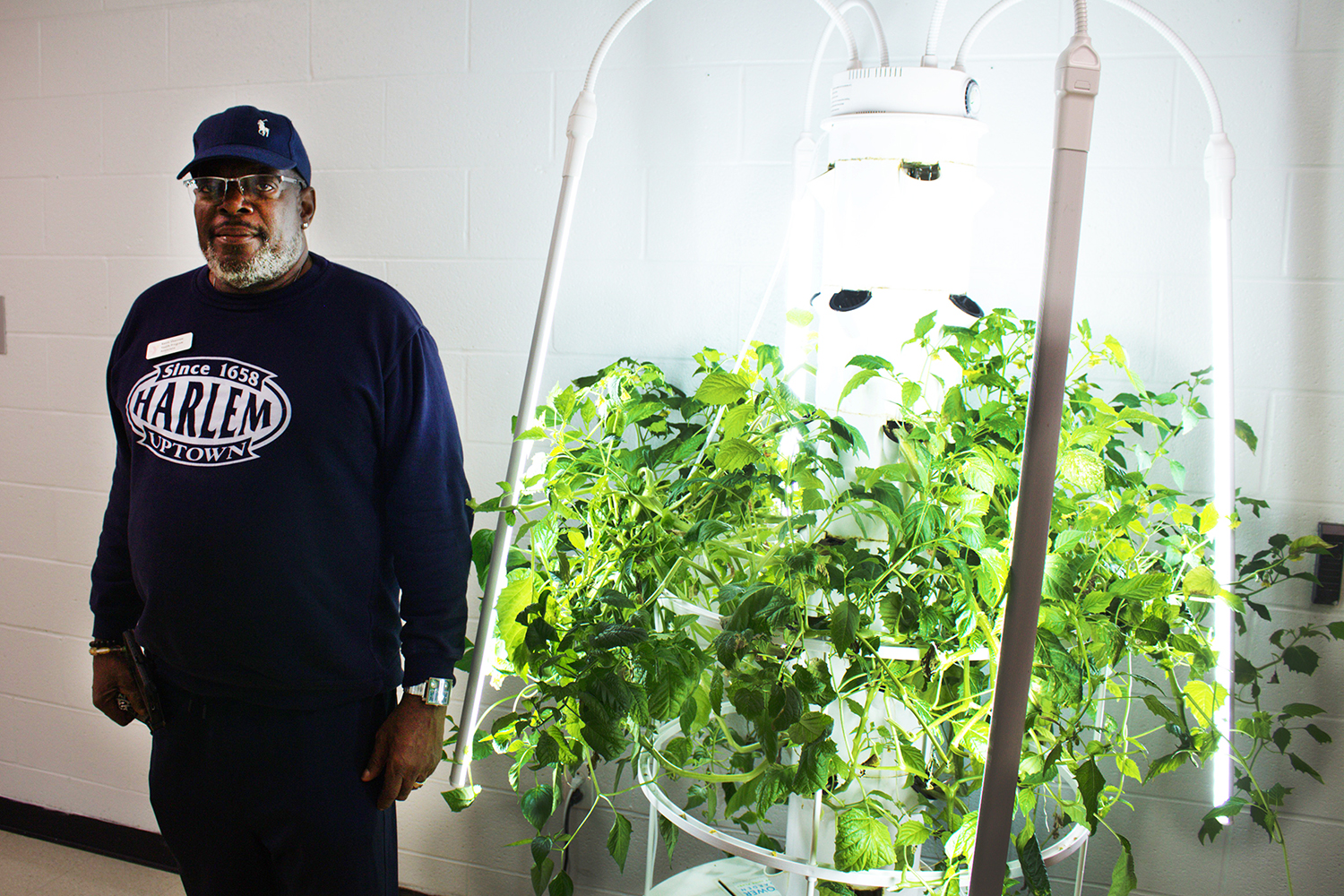When Evan Wolfgang ’25 (SFA) set out to drive from his home in Indiana to UConn Storrs for the start of his senior year this fall, the acting major in UConn’s School of Fine Arts realized that his route would take him past two seemingly different historical landmarks that share a surprising connection.
The first landmark, in Mentor, Ohio, is the home purchased by James A. Garfield, the 20th president of the United States who was assassinated only months after his inauguration in 1881. Now a National Historic Site, the estate is where Garfield settled with his family in 1876, and it includes the first presidential library established in the country.
The second landmark, in Oneida, New York, is the Oneida Community Mansion – an historic house that now offers rental apartments and overnight lodging for travelers and sightseers as well as a small museum dedicated to the memory of the Oneida Community, a religious Utopian commune founded in 1848 that originally occupied the site.
It’s also where the man who assassinated Garfield – Charles Julius Guiteau – lived for five years as a member of the commune.
“It was really neat to, on my drive here, hit two majorly important locations to this story,” says Wolfgang, who visited both sites.
But his stops at the two landmarks weren’t on a whim.
They were all about research into a former U.S. president and the man who took his life, and an effort to tell their story through a new, original production, supported by an undergraduate fellowship at UConn.
What Brings You There?
John Wilkes Booth, Charles Guiteau, Leon Czolgosz, and Lee Harvey Oswald.

In American history, their four names live in infamy – each was an assassin who took the life of a sitting American president.
Though they often inspire curiosity much in the same way that documentaries about serial killers and stories of true crime can captivate an audience, assassins are a different kind of killer, says Wolfgang.
“There’s something about assassins,” he says. “Because to kill someone, it’s already, Oh my God! But to kill a figure, someone who most of these people don’t have any personal connection to – to me, that is so much more interesting. It’s so complex. Because what goes into that? What brings you there?”
But the story of one of the four canonical presidential assassins, in particular, has fascinated Wolfgang for years.
“Charles Guiteau caught my mind because his story is crazy and very theatrical,” says Wolfgang.
And the theater is where Wolfgang, himself, thrives.
Wolfgang grew up in a small town in central Indiana, and started acting in the third grade, but it wasn’t until high school that he realized he wanted to pursue acting as a career, while also stretching his wings as a “theater creator.”
“I have such love for directing, and I have such love for writing, and I always have,” he says. “When I was younger, I wanted to be a writer, even before I wanted to be an actor.”
He came to UConn to study acting, because he liked all that the University’s program had to offer. Unlike many other programs, UConn’s BFA wasn’t focused on musical theater, he explained, and the small program size and opportunities for collaboration with other dramatic arts – like the puppetry program – really drew him to Storrs.
Writing a play about Charles Guiteau had been an idea of his for years.
“I’ve worked on and off, on and off – I start work, I make my timeline, start some research, and then I get busy,” he says. “I’m in a show, and it kind of falls off.”
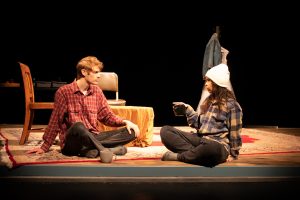
Last year, he learned about undergraduate fellowships available through UConn’s Humanities Institute, which provide opportunities for individuals at various levels to pursue advanced work in the humanities. Fellowships are year-long and offer support, mentorship, time, and space to research, write, and collaborate on work that extends and supports humanities scholarship.
“To have an opportunity to create a humanities project based in research – it was the perfect fit for this idea I already had and wanted to do, that was already on my mind,” says Wolfgang, who applied and was accepted into the current cohort of fellows.
“Never before have I had so much support for a project,” he says. “I have so many enthusiastic voices around me, which on one hand it’s like, OK, I’ve got to deliver now. But really, for me and my personality, that’s so much more freeing.”
For the last several months, Wolfgang has been extensively researching the lives of Guiteau, Garfield, and the people who surrounded them and contributed to their story – diving into their original papers and diaries, their biographies, and other historic documents available in digital archives housed at the Library of Congress and other institutions.
And visiting the historic sites in Ohio and New York, where he’s already made connections with other scholars who have helped guide him in his playwriting.
What he’s learned so far is that the already theatrical story is far more human, complex, and relevant than he originally anticipated.
“There’s a serious and a farcical side to Guiteau’s story,” Wolfgang says. “His biographers describe his trial as this combination – they use the words tragedy and farce, because it is so absurd. That intersection is really interesting to me, and there’s so much that speaks to our world today.
“Because at its heart, this is a story of radicalization.”
To the Lordy
Born in 1841 in Illinois, Charles Guiteau had an unusual life, notable for its curiosities as well as its lack of accomplishment. He failed an entrance examination to attend the University of Michigan in 1860, and joined the Oneida Community that same year, but left within five years after his relationship with the commune’s founder soured.
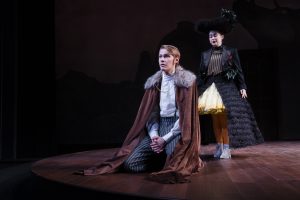
An unsuccessful lawyer, Guiteau settled in New York in 1872 and took an interest in politics. After he survived a boat crash on the Connecticut River in 1880, Guiteau reportedly believed he had been spared from harm in order to serve a higher purpose.
During the 1880 presidential campaign, the Republican Party was largely split between two factions – the Stalwarts, led by Roscoe Conkling, who supported President Ulysses S. Grant for a third term, and the Half-Breeds, led by James G. Blaine.
“There’s a real partisan divide that’s happening at that time between Stalwarts and the Half-Breeds,” says Wolfgang, “and that political turmoil leads to the assassination as much as the religious fanaticism.”
Guiteau, who had become a staunch Republican, took sides with the Stalwarts and wrote a speech supporting Grant, which he changed to Garfield – changing little else in the speech besides the name – when the latter ultimately won the party’s nomination. Guiteau delivered the speech twice, at most, but nonetheless believed himself to be largely responsible for Garfield’s ultimate victory and expected to be rewarded for his efforts, in particular by being named consul to France.
In reality, Guiteau played no role in Garfield’s electoral win in November 1880. The two had never met.
While Garfield was beginning his term after his inauguration in March 1881, Guiteau grew more disillusioned, convincing himself that Garfield would destroy the Republican Party and needed to be replaced by the elevation of his vice president, Chester Arthur.
On Saturday, July 2, 1881, Guiteau shot Garfield at the Baltimore and Potomac Railway Station in Washington D.C. Guiteau was immediately arrested, and Garfield died two and a half months later.
Guiteau’s trial was one of the first high-profile U.S. cases based on a temporary insanity defense, though Guiteau insisted he was not insane.
The trial was also described as a circus, and Guiteau became a media sensation for his behavior. He cursed at and insulted the judge, witnesses, the prosecution, and even his own defense attorneys. He delivered his testimony in the form of epic poems. He was almost assassinated twice himself.
Guiteau was ultimately found guilty and sentenced to death. Before his execution on June 30, 1882, he recited a poem he had written that morning – the now infamous, “I Am Going to the Lordy.”
“I saved my party and my land, Glory hallelujah! But they have murdered me for it, and that is the reason I am going to the Lordy. Glory hallelujah! Glory hallelujah! I am going to the Lordy!” — Charles Julius Guiteau, 1882
Carving out Identity
Though the story of Guiteau and Garfield is now nearly 150 years old, some of its key elements don’t feel so far away from modern times, Wolfgang says.
Issues surrounding religious radicalization.
How young white men who are lacking identity can find themselves drawn to radicalized ideologies.
How human relationships are complex, whether they occur in the 1800s or the 2000s.
“As I’ve researched these people, it’s always, ‘mad man shoots the president, crazy guy shoots the president,’” says Wolfgang. “Which, strictly speaking, isn’t untrue. We understand that Guiteau had a lot of mental illnesses. But there’s so much there.
“‘Mad man shoots the president’ – that’s such a reductive statement.”
It’s never that simple.
“No sane person is shooting the president,” he says. “But what else is here? Someone like Roscoe Conkling, who’s this big head of this political party – what role does he have? What complicity does he have? This whole religious ecosystem of the mid-1800s?
“And because it is a drama, it forces us, as audience members, to also question our own complicity.”
Wolfgang hopes to give audiences that chance by premiering his play – titled “I Am Going to the Lordy: A Dramatic Parable” after Guiteau’s conclusive poem – in the spring.
Though it’s not his first work as a playwright – he presented his own adaptation of Lewis Carroll’s “Alice’s Adventures in Wonderland” this past spring at the first Rojo Fest – it is his largest original project as a young creator.
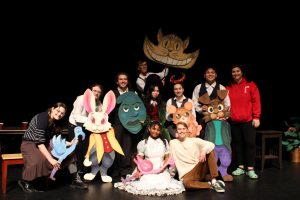
It’s also one of two projects currently under development through the production company he’s founded with fellow UConn acting student Kat Corrigan ’25 (SFA) called Jump the Creek Productions. The second is an adaptation of Anton Chekhov’s 1895 work “The Seagull” performed with puppets.
“The identity we’ve carved out is working with classical and historic works,” Wolfgang says. “That’s something I find very interesting. I’m very interested in the works of yore and recontextualizing them. Old stories have always fascinated me. What can they do? How can we retell these?”
When Wolfgang graduates from UConn this coming spring, he hopes to start his acting career in either New York or Chicago and potentially to pursue a Master of Fine Arts degree sometime in the future – he’s taught youth theater in his hometown for a number of years and would like to teach on the collegiate level someday as well.
But he definitely doesn’t plan to stop writing, or to stop pursuing opportunities like the Humanities Institute fellowship, which allowed him to become immersed in his intensive, historically based project.
“This fellowship has been so enriching, and this was something that I didn’t even initially consider as an option,” he says. “But now, this has been completely opened up to me, and it has been one of the most fulfilling projects of my undergrad. So, I will be applying to fellowships and residencies on top of normal acting gigs. And then, continuing to create my own work – I kind of feel that I am incapable of not doing that.
“To me, this fellowship project is the culmination of everything I’ve done at UConn, because I have done so much more than just rehearse scenes. It’s been the directing, and the writing, and the puppeteering, all of this. The connections – I have people and collaborators. That’s what this play really is.”
To follow Wolfgang’s progress on “I Am Going to the Lordy: A Dramatic Parable” and other productions, follow Jump the Creek Productions on Instagram @jumpthecreek.
For more information about fellowship opportunities through UConn’s Humanities Institute, visit humanities.uconn.edu.
